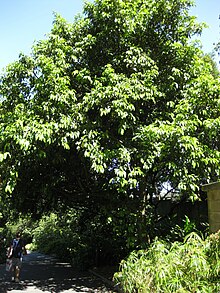Idiospermum
| Idiospermum | |
|---|---|
 |
|
| Habit in cultivation | |
| Scientific classification | |
| Kingdom: | Plantae |
| Clade: | Angiosperms |
| Clade: | Magnoliids |
| Order: | Laurales |
| Family: | Calycanthaceae |
| Genus: |
Idiospermum S.T.Blake |
| Species: | I. australiense |
| Binomial name | |
|
Idiospermum australiense (Diels) S.T.Blake |
|
Idiospermum is a genus containing a single species of tree, Idiospermum australiense, found in Australian tropical rainforests. Scientists recognise them as one of the species of the earliest known lineages to have branched out from the first flowering plants and still living today. Since as long ago as 120 million years, they continue living today only in the Daintree and Wet Tropics rainforests region of north-eastern Queensland. They grow naturally only (endemic) in very few locations in north-eastern Queensland (e.g. in Daintree National Park), in the very wet lowland parts of the forest, in groups of 10-100 trees together (rather than scattered individuals). Common names include ribbonwood and idiot fruit (Hyland et al. 2010).
Ribbonwood trees grow naturally in their wet tropical rainforest habitats as evergreens up to about 20–40 m (70–130 ft) tall and about 90 cm (35 in) in diameter at breast height (DBH). The simple leaves grow singly, in pairs or in whorls of 3-4, each one measuring about 12–25 cm (5–10 in) long and 5–9 cm (2.0–3.5 in) wide. The flowers measure 4–5 cm (1.6–2.0 in) in diameter, with all floral organs spirally arranged (Staedler, Weston & Endress 2007). The tepals are initially creamy white when the flower opens, then turn red as the flower ages. The "fruits" have very distinctive features and do not fit within the definition of true fruits as such: all the protective layers decay while still on the parent tree and each one released is an extremely large (8 cm (3.1 in) diameter) naked plant embryo (Staedler, Weston & Endress 2009). This is one of the very largest embryos in flowering plants. It is very toxic, inducing symptoms (in cattle) similar to strychnine (Hyland et al. 2010).
...
Wikipedia
